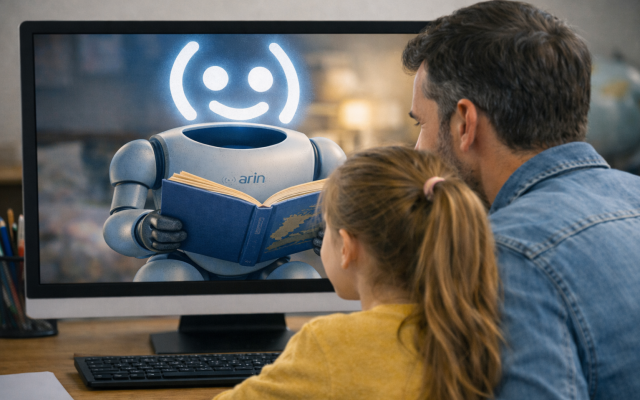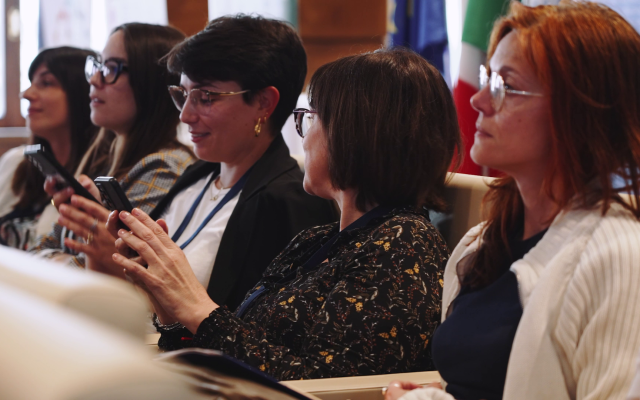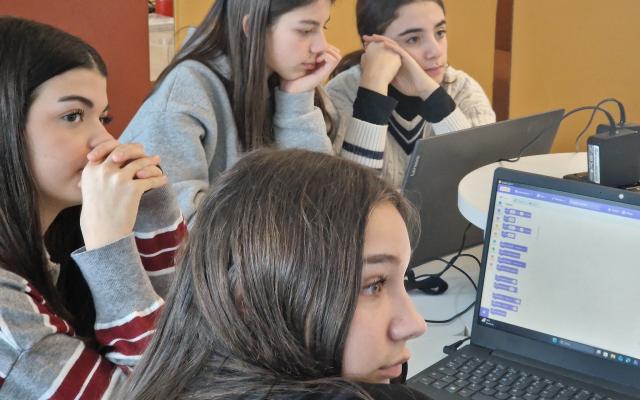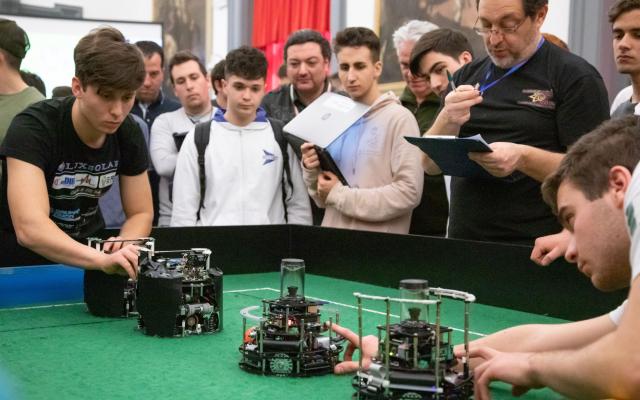The candidates selected by the jury for the third edition of the Most Promising Researcher in Robotics and Artificial Intelligence 2025 award
The finalists for the third edition of the Most Promising Researcher in Robotics and Artificial Intelligence award, promoted by the Fondazione Mondo Digitale together with the Campus Bio-Medico University of Rome and Roma Tre University, as part of the RomeCup 2025, to be held in the capital from 7 to 9 May, have been selected.
After evaluating 270 applications from all over Italy, the young talents who are redefining the future of robotics, artificial intelligence and their applications in medicine, the environment and society have emerged.
The award, worth 20,000 euros, recognises passion, creativity, vision and innovation.
Let's find out who the finalists are:
 Veronica Bartolucci, 32 years old | Marche Polytechnic University
Veronica Bartolucci, 32 years old | Marche Polytechnic University
Coordination of swarms of robot fish for underwater exploration
She develops mathematical models to coordinate swarms of underwater robots, with applications in environmental monitoring and marine patrols. She combines autonomous robotics and AI with a strong focus on sustainability.
 Pietro Bilancia, 32 years old | University of Modena and Reggio Emilia
Pietro Bilancia, 32 years old | University of Modena and Reggio Emilia
Collaborative robotics for Industry 4.0
Designs intelligent mechanical components and machine learning tools to optimise the precision of industrial robots, reducing costs and improving safety in the factories of the future.
Valentina Cesari, 33 years old | IMT Alti Studi Lucca / University of Pisa
Cyborg – Embodiment and sensory substitution in teleoperation
She studies how to improve human-robot interaction in critical teleoperation contexts, such as surgery or drones, by combining cognitive neuroscience and artificial intelligence.
 Valerio Guarrasi, 29 years old | Campus Bio-Medico University of Rome
Valerio Guarrasi, 29 years old | Campus Bio-Medico University of Rome
Virtual Scanner for generating medical images with AI
Creates high-fidelity synthetic radiological images to democratise access to advanced medical imaging, reducing costs and time in early diagnosis.
 Vittoria Laghi, 28 years old | University of Bologna
Vittoria Laghi, 28 years old | University of Bologna
LATTICE – Metal 3D printing for sustainable construction
Experiments with the use of 3D printing and artificial intelligence to optimise materials and geometries in construction, bringing innovation and sustainability to the building industry..
 Clemente Lauretti, 34 years old | Campus Bio-Medico University of Rome
Clemente Lauretti, 34 years old | Campus Bio-Medico University of Rome
AI-assisted robotic spinal surgery
Designs a platform for high-precision spinal surgery, integrating 3D reconstruction, cooperative robotics and augmented intelligence
 Pietro Mascagni, 34 years old | Catholic University of the Sacred Heart / Gemelli Polyclinic
Pietro Mascagni, 34 years old | Catholic University of the Sacred Heart / Gemelli Polyclinic
AI in surgery: error prevention
Develops a digital co-pilot for minimally invasive surgery, capable of supporting the surgeon during surgery in real time, improving safety and training.
 Simone Mentasti, 30 years old | Politecnico di Milano
Simone Mentasti, 30 years old | Politecnico di Milano
ADAS for safe urban mobility
Creates an intelligent system to protect pedestrians and cyclists at city crossings, integrating deep learning and distributed urban sensors.
 Christian Tamantini, 34 years old | CNR, Institute of Cognitive Sciences and Technologies
Christian Tamantini, 34 years old | CNR, Institute of Cognitive Sciences and Technologies
Intelligent robotics for personalised rehabilitation
Design robotic systems capable of dynamically adapting to the patient's physiological state to make rehabilitation more effective and personalised.
 Selene Tomassini, 32 years old | University of Trento
Selene Tomassini, 32 years old | University of Trento
Automatic reporting for emergency brain CT scans
Develops an open source AI system to automatically generate radiology reports in emergency rooms, improving the timeliness and accuracy of neurological diagnoses.
 Konstantinos Zormpas-Petridis, 34 years old | Agostino Gemelli University Hospital Foundation IRCCS
Konstantinos Zormpas-Petridis, 34 years old | Agostino Gemelli University Hospital Foundation IRCCS
MRI acceleration and virtual biopsies
Applies deep learning and radiomic analysis to reduce MRI times and replace invasive examinations, promoting faster and more accessible medicine.
The winner will be announced during the official RomeCup ceremony on 8 May 2025 at the Sala Esedra of the Capitoline Museums [see news item Research Award, nearly 300 applications under review].




